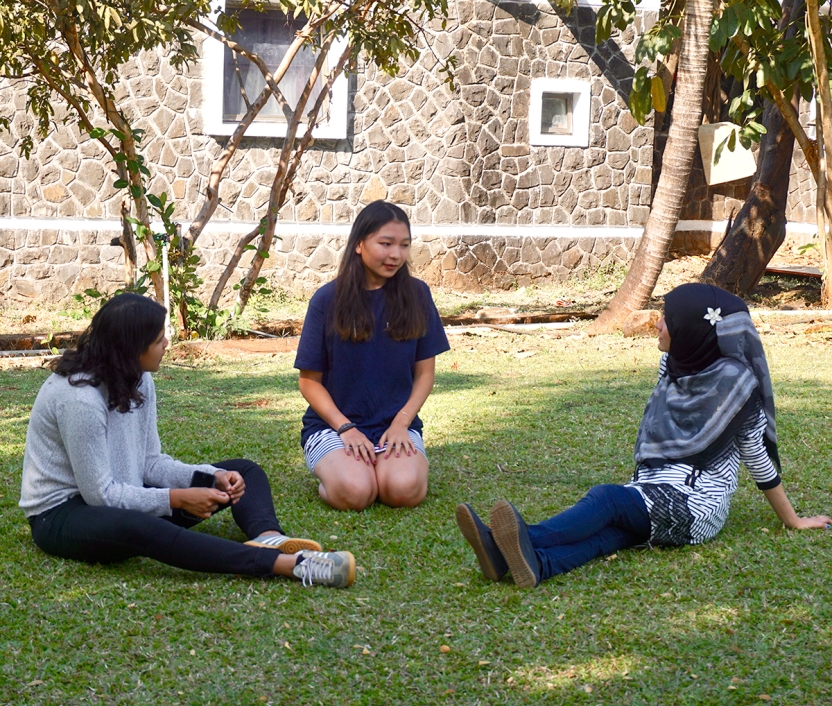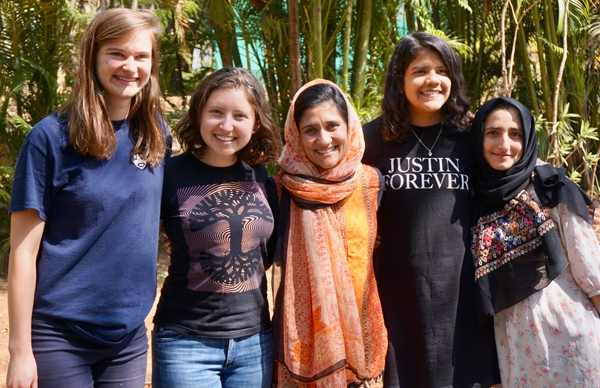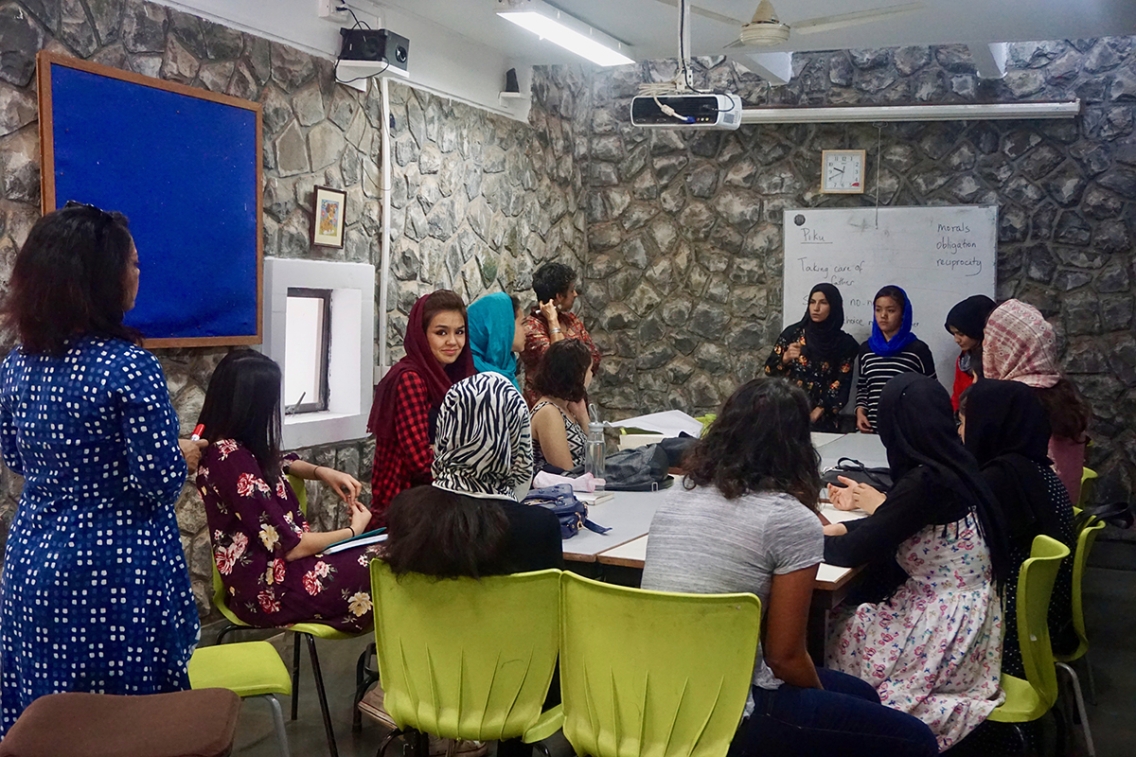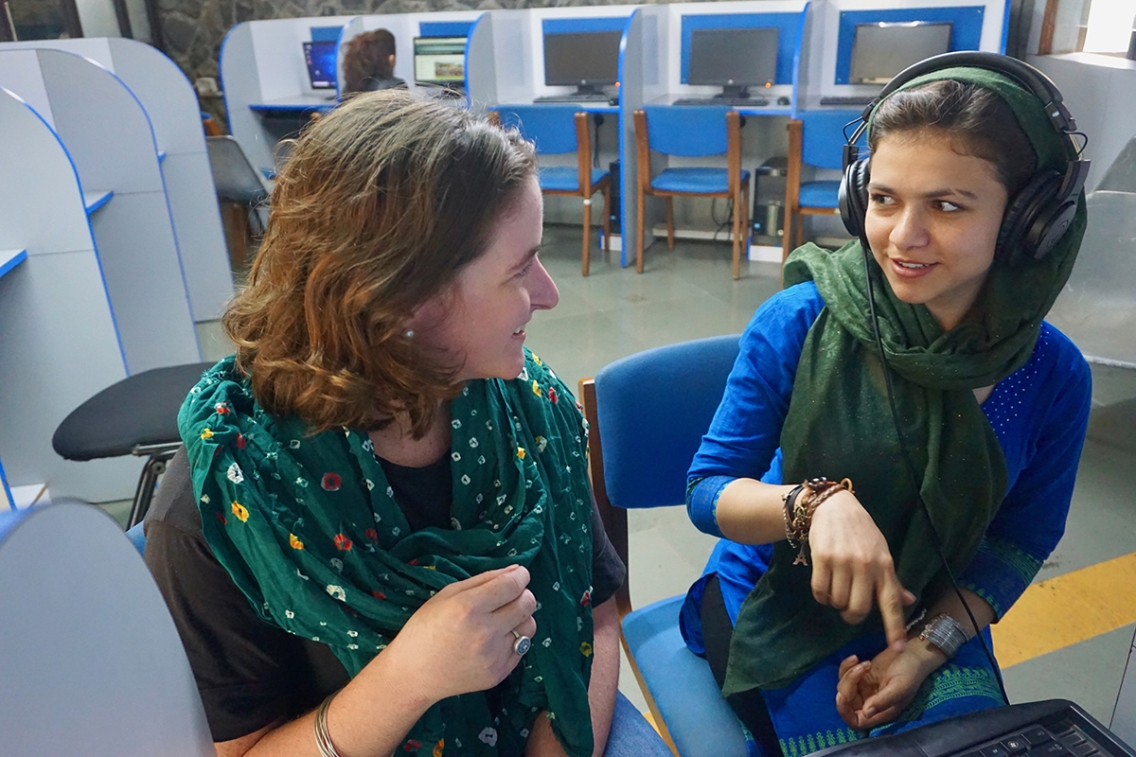BOLD Scholars Offer Mentoring and Friendship to Rising Generation of Afghan Women
| by Gaen Murphree

MIDDLEBURY, Vt. – For Middlebury junior M. J. Pascual, it was the embarassing moments that built a bond of trust in mentoring a group of high school girls from Afghanistan.
“We went on a hike together, and they were laughing at me because I’m not an outdoor person. I was like, ‘Oh my god, something’s poking at me!’ and they said, ‘It’s just a leaf.’ I’m not scared of animals, but I saw a lizard crawling up something and I ran, and they were like, ‘Where did she go?’
“I think them seeing how crazy I am is what also made them comfortable sharing who they are.”
These personal connections served Pascual well when she planned and led the girls’ class on computer coding. The high schoolers got so excited to learn this new skill that Pascual said she often had to nudge them on to the next activity.

Pascual and three otherBOLD scholars recently returned from the city of Pune in western India, where they participated in a monthlong collaboration between Middlebury College and the School of Leadership, Afghanistan (SOLA), a girls’ boarding school cofounded by Shabana Basij-Rasikh ’11.
“We were there to teach the girls from SOLA, but we also learned a lot from them. Just putting all these women in a room together—what we were able to learn together is really something to think about,” said Cece Alter, a junior double majoring in education and American studies.
The BOLD Women’s Leadership Network seeks to address challenging social issues by building women’s leadership on college campuses. Alter, Pascual, and fellow BOLD cohort members Laura Castillo and Anna Novak spent winter term mentoring SOLA’s 11th and 12th graders.
SOLA, too, seeks to create change one young woman at a time—something school president Basij-Rasikh knows firsthand. Since arriving as a Middlebury first-year over a decade ago, Basij-Rasikh has emerged worldwide as an outspoken humanitarian, educator, and champion of women’s rights. Growing up in Afghanistan under Taliban rule, she braved the streets, disguised as a boy and hiding her books in a shopping bag, to attend a secret school.

“I remember reading an essay by Ralph Waldo Emerson called ‘Self-Reliance’ my freshman year,” said Basij-Rasikh. “By far, the most profound takeaway I had from reading that essay was what Emerson considered the greatest sin to be: To not share what we know. I believe it had such an impact on me because it beautifully captured what my parents instilled in me growing up. My parents were invested in our education because they wanted us to give back, to become leaders, doers, and makers of change that they dreamed about in Afghanistan. Today, every student at SOLA understands that her education has a real purpose—to give back to her community locally, nationally, and internationally.”
Basij-Rasikh said she had long wanted to bring Middlebury and SOLA together. So she and Middlebury Vice President for Student Affairs Baishakhi Taylor began strategizing how to accomplish this partnership in ways that would be mutually enriching.
“The world is so full of disparate realities,” said Taylor. “There are skills we all need to cultivate to be successful in an interculturally entangled world.”
The two decided that the best place for this meeting of the minds would be on United World College’s Mahindra campus, with Middlebury faculty teaching a class for SOLA’s upper-level students, and Middlebury students acting as teaching assistants and mentors.
Taylor cocreated the class with Sujata Moorti, Charles A. Dana Professor of Gender, Sexuality, and Feminist Studies.

“Shabana wanted two things,” said Moorti. “She wanted the students to learn how to do critical thinking and then she also felt that the cultural change between being in Afghanistan and then coming here [to the U.S.]—understanding how race plays, how gender plays, how identity is very different—she wanted them to have some basic understanding of those issues so that they don’t feel completely shell-shocked when they arrive.”
Because Afghanistan is still a war-torn country, education can be quite fragmented, said Moorti. Other challenges when these young women go abroad can include learning to swim or ride a bike for the first time or navigate campus culture.
Moorti decided the best way to teach critical thinking skills would be to use material that was already fun and familiar, so the syllabus included a number of Bollywood films. One classroom discussion, for example, compared Julia Roberts’s character in Pretty Woman to the dutiful daughter in Dilwale Dulhania Le Jayenge, a beloved Bollywood story about a girl whose father insists on an arranged marriage, then ultimately yields to her love match. Which is a “good girl? Which is a “bad girl”? Why? What are the values we use to define ourselves or other women as good or bad? To what extent are these ideas culturally defined or determined? How can we examine such constructs critically?
From the start, the SOLA students were “talkative and completely assertive, and they would get into these really engaged arguments,” said Moorti. “But it was at the level of ‘I like it; you don’t,’ ‘You hate me; I hate you,’ that kind of thing; so breaking them up into small groups with the BOLD scholars, giving them specific questions so they could formulate responses so that when they came back to the larger group they knew how to answer in a focused way, that was one of the most productive parts of what the BOLD scholars helped them to do.”
For the BOLD scholars, experiences outside the classroom proved just as important.
The Middlebury juniors helped the younger students improve their biking skills, introduced them to basketball, helped out at swimming lessons. Together the young women went for hikes, ate together, laughed together, and just hung out and talked.
That bonding laid the groundwork for more questions.
“Sitting outside of our room they would ask questions like ‘So what’s college like?’ ‘Do you party?’ ‘What do you do when this happens?’ They also had questions like ‘What is it like to look different in the United States?’ which is a really good question because I think to them the idea of a typical American is white, blond, and blue-eyed.”
Yet central to the exchange was understanding and avoiding what Nigerian novelist Chimamanda Adichie has eloquently called “the danger of a single story”—lessening someone else’s humanity by seeing them through one lens only. The group watched Adichie’s TED Talk as part of class discussion.
Said Pascual of one of her new friends: “I don’t see her as an orphan. I see her as someone who’s crazy about the old Taylor Swift but hates the new Taylor Swift.”
“I was particularly excited to see BOLD scholars join us for the pilot year of this program,” said Basij-Rasikh. “I knew that they would be great role models for our students… . It was a special month filled with profound learning moments for everyone involved.”
Sitting in the Davis Family Library’s Wilson Café, Laura Castillo reflected that “if you don’t really get to know people, it’s easy to place them in a certain box. It’s easy for me to go to India and say, ‘Here are these young Afghani women, and we’re going to teach them something,’ and that’s it. But coming out of the experience, it’s more like I got to go and meet friends and have these almost like little sisters in my life and figure out all the sides to them—how smart and intelligent they are and how funny and how complicated their lives are and how they can still push through all that and smile and have fun.”
Castillo continued: “I think as a leadership model for you to be able to lead alongside people, you need to know who they are and what makes us different and what connects us.”
